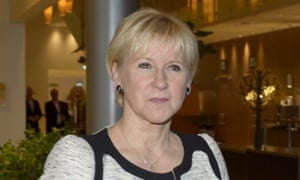 Sweden’s foreign minister has said she stands by her denunciation of a
Saudi blogger’s flogging as medieval, three months after her criticism
of the Gulf kingdom’s human rights record ignited a diplomatic crisis and infuriated business leaders fearful for trade losses.
Sweden’s foreign minister has said she stands by her denunciation of a
Saudi blogger’s flogging as medieval, three months after her criticism
of the Gulf kingdom’s human rights record ignited a diplomatic crisis and infuriated business leaders fearful for trade losses.Margot Wallström, who vowed to pursue a feminist foreign policy when taking office last year, first hit out at the treatment of Raif Badawi earlier this year after the first 50 of 1,000 lashes was inflicted on him in January for allegedly insulting Islam.
Saudi Arabia reacted furiously to her comments, blocking a speech she was due to give on women’s rights to Arab leaders and temporarily breaking off relations with Sweden.
But speaking on Monday, a day after it emerged that Saudi Arabia’s highest court had upheld Badawi’s punishment, Wallström said she was unrepentant and said again that the flogging amounted to medieval methods.
“I would not have done things differently,” Wallström told the Guardian when asked about her handling of the crisis in March, which also saw Stockholm tear up an arms trade agreement with the Saudis. “No, I do not regret the medieval remark; we have not excused ourselves. But we have explained that this was not an attack on Islam.”
Her words suggested that the criticism Wallström faced at home from business leaders concerned about damage to Sweden’s reputation – and to its $900m annual trade with Riyadh – had not made her deviate from her fundamental principles. On the contrary, she said, the support she had received for taking a stand helped raise the profile of her feminist approach.
“I have almost never in my political career experienced such enormous support from around the world,” she said. “The instinct was: if we don’t defend democracy and human rights, what are we?” She added: “You gain respect by saying ‘This is our view’ … It has definitely given us, and given me, a name for standing up even when it was very difficult.”
And difficult it was. At the time of the row, Arab leaders lined up to support Saudi Arabia, calling Wallström irresponsible and unacceptable. The rift came as a shock to Stockholm’s left-leaning coalition, which had expected plaudits after becoming the first EU member to recognise the Palestinian state last autumn. Relations with Saudi Arabia are now back to normal.
Perhaps inevitably, the affair has shone the international spotlight on Wallström’s advocacy of a feminist foreign policy – and, equally inevitably, not all the attention has been flattering. But Wallström, a former EU commissioner, is undeterred. She believes that approaching foreign policy from a feminist perspective is an essential tool to ensure humans rights were respected for both men and women.
“You have to see the world from the woman’s perspective,” she told journalists in a wider briefing on Monday. “It means a lot if you keep those glasses on.”
“It is not a magic wand, not a list of political ideas – it is tools and ideas you can use to make sure we live up to human rights,” she said. If you don’t ask about the situation of women and children, you can overlook possible war crimes in places such as east Ukraine, she said.
The UN is at the centre of Sweden’s foreign policy objectives, Wallström added, because global problems need global solutions. The country is campaigning hard to win a seat on the UN Security Council in 2017. Paraphrasing Dag Hammarskjöld, the organisation’s former Swedish general secretary, she said: “The UN is not there to take the world to heaven but to prevent it going to hell.”
Feminism must become part of peace and security issues, with women at the negotiating table, she added. “Are women among the signatories to peace and ceasefire agreements? We have to make sure that the question is being asked.”
However, despite Wallström’s ethics-driven rhetoric, Sweden continues to sell weapons to Saudi Arabia and other countries with poor human rights records, such as Pakistan and the United Arab Emirates – much to the disapproval of her own Social Democrat party. “Any country that wants peace and at the same time produces weapons ends up with moral dilemmas. We have to deal with them,” Wallström said. “We have to live with these kind of contradictions.”
A parliamentary commission on the arms trade is due to report at the end of this month. Wallström declined to state her position until the review is public.
On Badawi, however, she is clear. Sweden would join the EU in condemning Badawi’s flogging, she said, and would not dilute its criticism. “You have to respect the right to free speech,” she said. “The protests will not stop.”
Δεν υπάρχουν σχόλια:
Δημοσίευση σχολίου